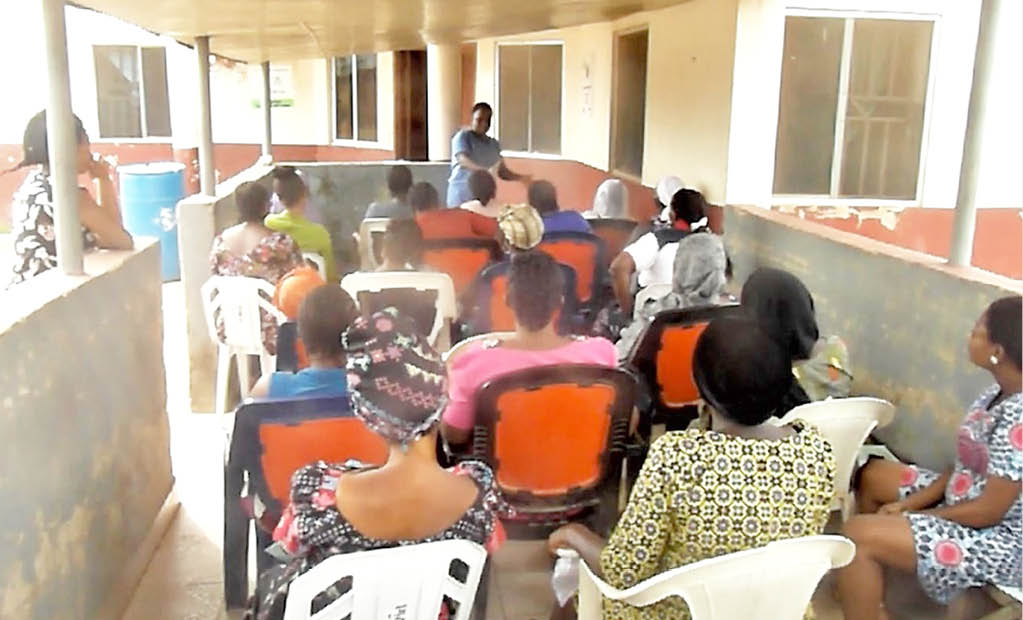From STIs to pregnancy, young people browsing to stay safe
It is Thursday afternoon and the campus of the University of Abuja is abuzz. Tables and chairs covered with red and white cloth are neatly arranged, like night-time dinner tables. The colours suggest a season; Valentine. It is becoming a big, strong word for young people. Came night and the yard in front of the […]

It is Thursday afternoon and the campus of the University of Abuja is abuzz. Tables and chairs covered with red and white cloth are neatly arranged, like night-time dinner tables.
The colours suggest a season; Valentine. It is becoming a big, strong word for young people. Came night and the yard in front of the girls’ hostel lit up with music and candlelight and laughter. It might have also ended up in sexual activity.
A short walk from the girls’ hostel stood two canopies with plastic chairs underneath. Under one canopy, students sat in rows, waiting for their turn to run an HIV test.
Interestingly, it is the group distributing free condoms that caught the attention of Friday Ayodeji. Fresh out of a lecture hall, he joins the crowd. He volunteers to answer a question defining what STIs are.
“The topic calls for attention,” he tells Weekend Magazine. “We need to have knowledge. Both the young and old are always interested in this word ‘sex’. Everybody is involved and there are repercussions, so we have to be careful.”
There is so much to be careful about, unplanned pregnancies on one hand and sexually transmitted infections and diseases on the other.
“The greatest asset anyone can have is the right to sexual and reproductive health. It is about my body, my health, my life,” says Mercy Bolaji, youth advocate on sexual and reproductive health at African Youth and Adolescents Network.
“Even young people should have access to a healthy sexual life, then the world is a better place.”
The messaging purposely targets youths especially those in a school environment.
For women aged 25 to 49, the median age at which they had their first sexual intercourse was 17, according to the 2018 National Demographic Health Survey.
The sensitization is about “condoms and keeping themselves protected and also abstain based on information they get, making informed choices about their health.” Says Kosi Izundu, programme officer for reproductive health and family planning at Pathfinder International.
“That will enable them to act well and make better choices for their health, even with all the euphoria of Valentine’s.
“Some are hearing of female condoms for the first time, others are seeing it for the first time. They are fascinated and curious. We target different populations. We are hoping we are reaching new minds, new people so the message is passed across to various groups, so it is not a repetition to the same people year in year out.”
Young people are turning to apps to have conversations about sex and life, they can’t bring up at home.
There is Diva, menstrual health and care app to help adolescent girls and young women learn more about their bodies and menstrual health.
There is Linkup, a service-finder app that links young people facing sexual health-related issues to youth-friendly centres around the country—and access to safe spaces where they can speak in confidence with counsellors.
Then there is Frisky, an app that calculates a young person’s risk of exposure using algorithms and then dispenses information on protection.
All were developed by Education as a vaccine against AIDS and link to a question-and-answer—and then onto a call centre that answers young people’s questions on HIV, sexual and reproductive health, relationships.
“These are the things that bother young people,” says Onche Inalegwu, programme assistance at Education as a Vaccine against AIDS, which developed the apps.
“We had focused group discussions with young and surveyed how they access information.
“It is difficult to meet your mum to talk about sex, your period, so we took advantage of technology.
“There are mobile apps everywhere, over a million. Young people can easily get this information from their mobile. They are accurate because we used trained experts, and it is anonymous.”
Young people are already asking an average of 1,000 questions a month.
Ayodeji has some questions too. “A lot of people fall, victims, out of ignorance, especially in a tertiary institution. People find themselves in it. Everybody has this sexual urge. In order to be disciplined, you have to get protection instead of falling pregnant or get a sexually transmitted infection that will ruin your life.”
